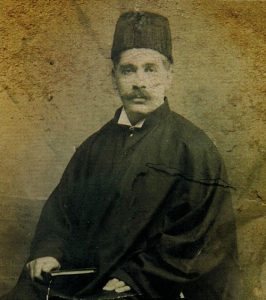Βιογραφικό του Ιακώβου Ναυπλιώτη
Άρχων Πρωτοψάλτης της Αγίας και Μεγάλης Εκκλησίας του Χριστού στην Κωνσταντινούπολη

Iakovos Nafpliotis, (or Nafpliotis or Naupliotis or Naupliotes: Greek: Ἰάκωβος Ναυπλιώτης) (1864 in Naxos – December 5, 1942 in Athens) was the Archon Protopsaltis (First cantor) of the Holy and Great Church of Christ in Constantinople (Istanbul, Turkey). Iakovos Nafpliotis is one of the first chanters to have ever been recorded; many people also regard him as being one of the greatest.
Biography
Iakovos Nafpliotis was born in Greece, on the island of Naxos (Cyclades) in 1864. The Nafpliotis family, which was originally called "Anapliotis", originated from Anaplous (an area along the western shore of the Bosphorus), and ran a printing shop in Naxos until the first half of the 19th century. The first to change the name from "Anapliotis" to "Nafpliotis" was Anastasios Anapliotis, who was a member of the Philiki Etairia.
Musical education
Iakovos travelled to Constantinople at the age of seven, where he was acclaimed for his exceptional vocal quality and was ordained as canonarch at the church Saint Nicholas. He was later on ordained as First Canonarch of St. George's Greek Orthodox Patriarchal Church in 1878 (when he was only 14 years old) and served this function for three years.
Iakovos had heard exceptional Patriarchal protopsaltes (right chorus leading chanters) such as Ioannis Byzantios (the surname "Byzantios" meaning "originating from Constantinople"), Konstantinos Byzantios and Georgios Raidestinos II (the surname "Raidestinos" meaning "originating from Raidestos"). They, in turn, had heard their predecessors: Daniel from Tyrnabos, Iakovos Giakoumakis from Peloponnesos, Petros Byzantios, and Gregorios the Levite. Iakovos' main teacher was Nikolaos Stoyianovitz the Lambadarios (left chorus leading chanter).
Main career
Iakovos Nafpliotis was the last chanter to have progressively passed through all the psaltic ophikion (officium) stages, in the following order and duration
First Canonarchos: 1878 to 1881 (14 to 17 years of age = 3 years of service)
Second Domestikos: 1881 to 1888, (17 to 24 years of age = 7 years of service)
First Domestikos: 1888 to 1905 (24 to 41 years of age = 17 years of service)
Archon Lampadarios: 1905 to 1911, (41 to 47 years of age = 6 years of service)
Archon Protopsaltes: 1911 to 1938 (47 to 74 = 27 years of service).
Iakovos Nafpliotis served at the Patriarchal Analogion for 60 years, and was blessed with the privilege of having chanted for a succession of 14 Patriarchs.
According to Angelos Boudouris, Iakovos Nafpliotis was concerned about the relative ignorance of chanters who were introduced into the Patriarchal Cathedral without going through the necessary officiums (such as the musicologist Protopsaltis Georgios Biolakis), and who were said by others to not be as proficient in the local Patriarchal style (hyphos) as was Iakovos. Iakovos, along with those of his subordinates, who had grown up in the Patriarchate, would "drag newcomers by the nose" in an obstinate effort to safekeep the tradition they had been taught. The unfortunate newcomers had no choice but to "follow along", in spite of their superior official positions. Boudouris was able to testify to all this because he grew up in the Patriarcheion as well, during the early 1900s.
Despite the general respect of Iakovos by the majority of people around him, there were several unsuccessful attempts to have him removed from the Patriarchate: Iakovos was actually replaced twice as Protopsaltis.[1]
Stylianos Tsolakidis, who was the First Canonarchos and later on helper Domestichos of Iakovos Nafpliotis – for a total of about 10 years – during the 1910 decade, claimed that Iakovos Nafpliotis was "a serious chanter and teacher, and that no one of his time chanted like him". Stylianos Tsolakidis had also chanted along Georgios Binakis (student of Nikolaos Raidestinos [who Tsolakidis had heard chant at a very late age], son and student of Georgios Raidestinos II) as first Canonarchos for two years, and along Nileas Kamarados as well, but no one in Constantinople had the "psaltic stability" or "stamima" of Iakovos. According to his testimony, Iakovos would chant everything by heart, in an upright position, without any corporal motion whatsoever, his lips barely moving. According to both Boudouris and Tsolakidis, Iakovos avoided talking in everyday life.
Iakovos Nafpliotis was once replaced for 6 months by Antonios Syrkas in the late 1930s. According to Boudouris, the latter did not know much about the Patriarchal method of chanting. During this period, Iakovos contemplated leaving Constantinople, given that some Greeks had doubts as to his right to remain on the Patriarchal analogion in terms of his citizenship, which (fortunately) did not seem to be an issue for the Turkish authorities.